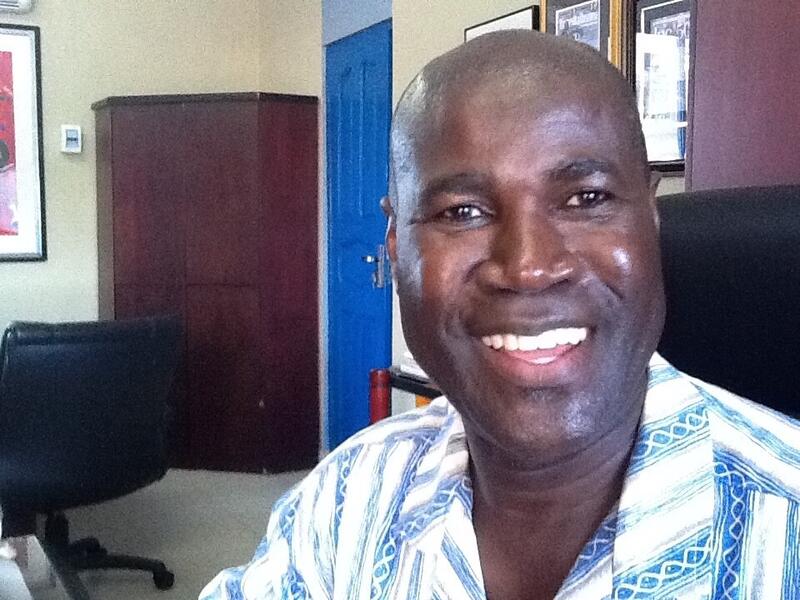An opportunity to recognize Sanford Health’s 10 years in Ghana quickly becomes a conversation about the next 10 for those who have been part of the process.
Kojo Taylor, president of Sanford World Clinic Ghana, recently spent time in Sioux Falls, South Dakota, talking to Sanford leaders about how the health care system’s presence has made an impression over the last decade in this West African country of more than 31 million people.
They also discussed how those efforts can provide the foundation for a wider and more impactful presence in the future.
‘Opportunities for both’ cultures
“Whenever you bring two cultures together there are going to be opportunities for both,” Taylor said. “Ghana can learn from interaction with its U.S. counterpart. And we think our U.S. counterparts can do the same. I think there are opportunities for us that we have not yet explored.”
Sanford Health’s involvement in Ghana has been what World Clinic vice president Jim Slack calls “a heavy lift” but the progress has been steady and significant. One original Sanford-affiliated clinic collaborated with the Ghana Ministry of Health and grew to 20, with more than 1.75 million patients cared for over these 10 years.
“Ten years isn’t a big amount of time,” Slack said. “Look at Sanford — we have 130 years of local history. We’re still infants in the international space, however. In the first phase we’ve learned about different cultures, different countries and how to provide health care in those places. Now we’re trying to take the next step in Ghana.”
Slack and Taylor can point to what the World Clinic has accomplished as reason to be optimistic about future endeavors. There have been several clear and tangible steps forward that have benefited many.
Virtual care. Sanford has worked with the Ghana ministry of health in helping establish policy guidelines for telehealth, providing valuable insight into how to incorporate this version of care in a way that can benefit staff and make care more accessible.
Electronic medical records. At what were previously government-run clinics, Sanford has installed medical record-keeping while also training the staff at those facilities. The plan is to eventually return these clinics to government supervision with record-keeping capacity intact.
“We think an initiative like this has been very beneficial,” Taylor said. “It does not just improve care in the community, it also creates benchmarks for the government to emulate as they continue to try to improve health care in the country.”
Prior to Sanford’s involvement, patients needing care at a clinic might wait an hour or more for staff to find their records. Now, via an electric medical record platform Sanford established, the registration process lasts about a minute, Slack said.
Cancer screenings. Sanford has worked with Ghana Health Service in establishing and improving techniques to detect breast cancer. In Ghana, mammography machines are not available. Because breast cancer is often in stage 3 or 4 by the time it can be discovered by the patient, leading to low survival rate, finding it earlier is crucial. Sanford is teaching nurses and midwives the proper techniques to detect it earlier.
“We’re trying to get in front of that a little more,” Slack said. “We want to see what we can do to turn those numbers in the right direction.”
Patient safety. Sanford clinics in Ghana have achieved a level 4 certification from SafeCare, an international agency that accredits organizations who demonstrate a culture of quality in everything they do to improve patient care.
“We’re one of the very few heath care organizations that has the top tier of accreditation,” Slack said. “We’re proud of that because it means we’re providing the right level of service.”
Now providing opportunities for nurses
One upcoming initiative involves the World Clinic Global Nursing Mentor Program sending select Sanford nurses to work with clinics abroad.
Both Slack and Taylor have been involved with Sanford’s presence in Ghana from the very beginning. It has been a learning process in Ghana, as well as in the other eight countries with World Clinics.
“Every model is different,” Slack said. “You have to find ways to adapt. But we’ve always followed the same principles — how do we provide the highest quality care for our patients? But it has to be culturally based. We can’t just take something from Sanford and implement it — we have to understand their culture and its nuances and ask ourselves how we’re going to implement what we’re doing in the right manner in that country.”
For Taylor, whose efforts in improving health care in Ghana have become a lifetime commitment, the progress has been heartening.
“It’s a dream come true to be able to provide the care in the manner we’ve been able to do it,” Taylor said. “It’s a very difficult task because you don’t have the same resources to deliver good, quality care in Ghana that as you do here. We are able to do more with less in Ghana and the relationship with Sanford has allowed us to be able to do more for the country. It’s been very fulfilling for me because if I was trying to do it by myself I would not have been able to impact the country nearly as much.”
Learn more
- 9 Sanford nurses help Guatemalan patients beyond clinic
- Podcast: World Clinic makes lasting health care changes
- Sanford World Clinic depends on local providers in Ghana
…
Posted In Company News, Nursing and Nursing Support, World Clinic
